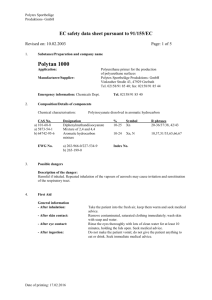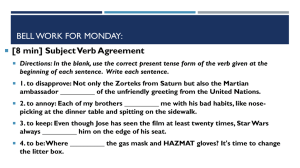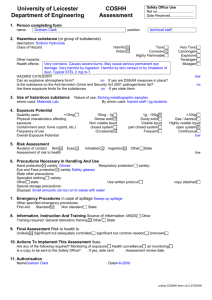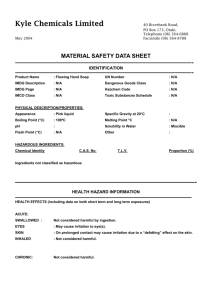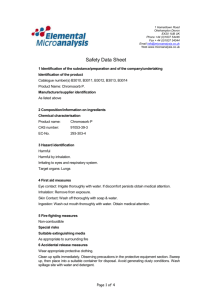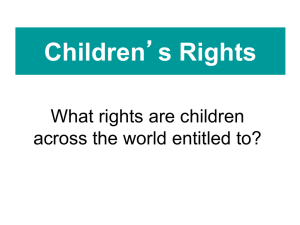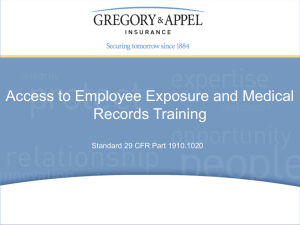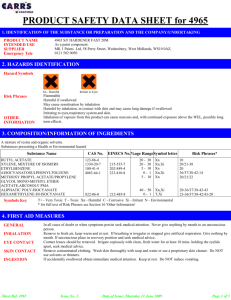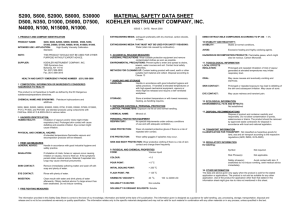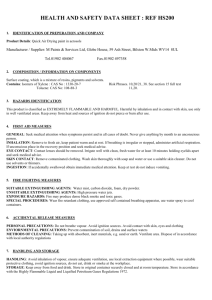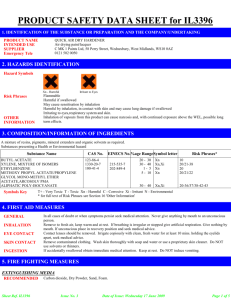Track MSDS 5
advertisement
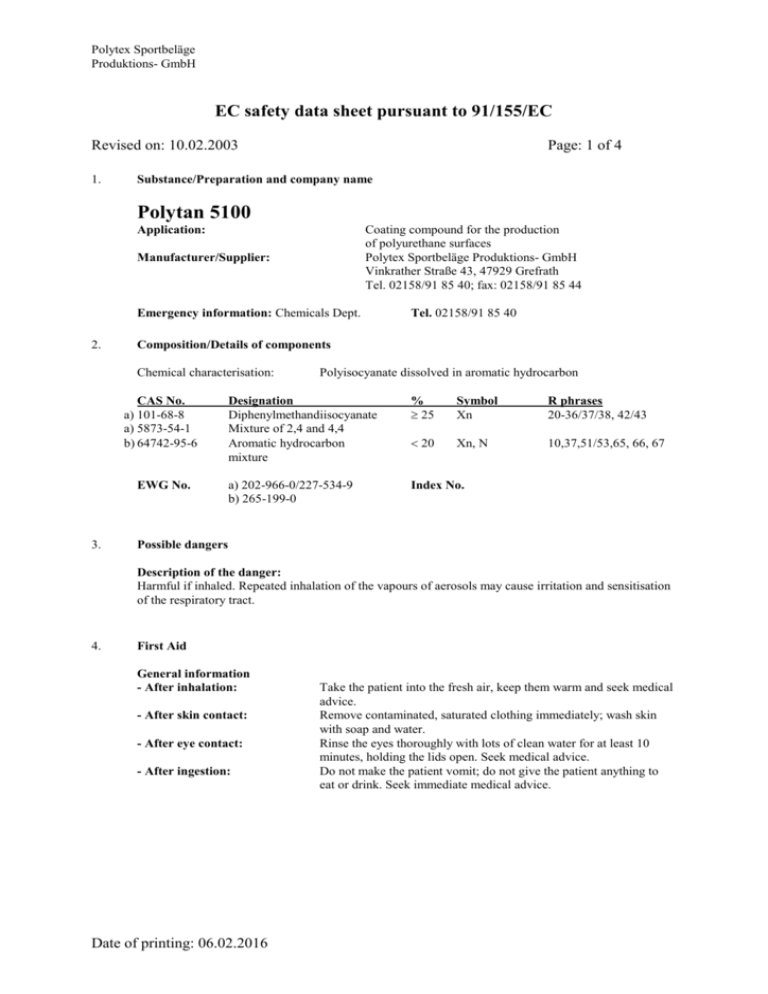
Polytex Sportbeläge Produktions- GmbH EC safety data sheet pursuant to 91/155/EC Revised on: 10.02.2003 1. Page: 1 of 4 Substance/Preparation and company name Polytan 5100 Application: Coating compound for the production of polyurethane surfaces Polytex Sportbeläge Produktions- GmbH Vinkrather Straße 43, 47929 Grefrath Tel. 02158/91 85 40; fax: 02158/91 85 44 Manufacturer/Supplier: Emergency information: Chemicals Dept. 2. Composition/Details of components Chemical characterisation: CAS No. a) 101-68-8 a) 5873-54-1 b) 64742-95-6 EWG No. 3. Tel. 02158/91 85 40 Polyisocyanate dissolved in aromatic hydrocarbon Designation Diphenylmethandiisocyanate Mixture of 2,4 and 4,4 Aromatic hydrocarbon mixture % 25 Symbol Xn R phrases 20-36/37/38, 42/43 20 Xn, N 10,37,51/53,65, 66, 67 a) 202-966-0/227-534-9 b) 265-199-0 Index No. Possible dangers Description of the danger: Harmful if inhaled. Repeated inhalation of the vapours of aerosols may cause irritation and sensitisation of the respiratory tract. 4. First Aid General information - After inhalation: - After skin contact: - After eye contact: - After ingestion: Date of printing: 06.02.2016 Take the patient into the fresh air, keep them warm and seek medical advice. Remove contaminated, saturated clothing immediately; wash skin with soap and water. Rinse the eyes thoroughly with lots of clean water for at least 10 minutes, holding the lids open. Seek medical advice. Do not make the patient vomit; do not give the patient anything to eat or drink. Seek immediate medical advice. Polytex Sportbeläge Produktions- GmbH EC safety data sheet pursuant to 91/155/EC Product: Polytan 5100 5. Revised on: 10.02.2003 Page: 2 of 4 Fire fighting - Suitable fire fighting agents: Foam, CO2, dry powder. Sand or soil may only be used for small fires. - Unsuitable fire fighting agents: Full water jet. - Special danger posed by the substance or preparation itself, its combustion products or resultant gases: Toxic and harmful substances may be released. Containers may rupture if overheated. If the product reacts with water it produces CO2 gas. In sealed containers this may result in a hazardous build up of pressure. Danger of bursting. Possible combustion products are: Carbon monoxide, nitric oxide, hydrocarbon and HCN. - Special safety equipment for fire fighting Full protection suit and compressed air breathing apparatus 6. What to do after accidental release - Personal precautions Avoid contact with the skin and eyes; do not inhale vapours. Remove sources of ignition, provide adequate ventilation. Keep persons not involved away from the scene. - Environmental protection Do not allow to get into the sewer, the soil or open water. - Cleaning / Mopping up Mop up or enclose with sand, soil or absorbent material. Do not use flammable material such as saw dust to mop up the product. Place in marked containers and then dispose of in a safe manner. 7. Handling and storage 7.1 Handling Instructions for safe handling Only use in well ventilated areas Avoid inhaling vapours and spray mist. - Fire and explosion protection instructions Take precautions to prevent electrostatic charging. 7.2 Storage: Store barrels dry and well sealed in a cool, well-ventilated place. Protect from direct sunlight and other sources of heat or ignition. Storage temperature: Room temperature 8. Exposure limits and personal protection equipment Personal safety equipment - Breathing protection - Hand protection - Eye protection - Body protection Date of printing: 06.02.2016 If there is a risk of inhalation, wear a half-mask with a combination filter for organic vapours and particles Wear safety gloves made of PVC or solvent-resistant rubber. Close-fitting goggles Long-sleeved safety clothing Polytex Sportbeläge Produktions- GmbH EC safety data sheet pursuant to 91/155/EC Product: Polytan 5100 9. Revised on: 10.02.2003 Physical and chemical characteristics - Form: - Colour: - Odour: - pH value: - Boiling temperature: - Flash point: - Ignition temperature: - Explosion limits (20°C): - Vapour pressure (at 50°C): - Density (at 20°C): - Solubility in/Miscibility with water: - Viscosity: - Distribution coefficient n-octanol/Water (log POW): 10. Liquid Diverse, red, green, blue Mild, aromatic Not applicable 150 °C 66 °C 370 °C Lower: 0.9% vol. Upper: 9.5% vol. Not found 1.08 g/m3 Insoluble, reacts with water 1000 +/- 200 mPas at 20 °C Not applicable, reacts with water and octanol Stability and reactivity Conditions to be avoided: Substances to be avoided Hazardous decomposition products 11. Page: 3 of 4 High temperatures Reacts with water, amines, alkalis and acids Unlikely in normal industrial applications. Toxicology information - Irritation effects Eyes: Irritates the eyes and respiratory tract. Skin: 12. Repeated and/or lengthy contact may cause skin degreasing and sensitisation. Ecology information Do not allow the product to get into open water, effluent or the soil. The product transforms into a solid, insoluble reaction product (polyurea) with a high melting point at the edges with water and also generates carbon dioxide. This reaction is greatly increased by active substances on the limit surfaces (for example liquid soap or water-soluble solvents). 13. Disposal information May be incinerated in a suitable plant pursuant to local official regulations. Date of printing: 06.02.2016 Polytex Sportbeläge Produktions- GmbH EC safety data sheet pursuant to 91/155/EC Product: Polytan 5100 Revised on: 10.02.2003 Page: 4 of 4 14. Transport instructions Land transport ADR/RID and GGVS/GGVE: Not a hazardous substance Ocean-going ship transport IDMF/GGVSea: Not a hazardous substance Air transport ICAO-TI and IATA-DGR Class 6.1 Packaging group: III 15. Regulations - Code letter and hazard code of the product: - Substance name on the identification panel (label): Xn, harmful Contains Diphenylmethane-4,4`-diisocyanate, isomers and homologues - R phrases: R 20: Harmful if inhaled R 36/37/38: Irritates the eyes, respiratory organs and the skin R 42/43: Sensitisation possible by inhalation and skin contact R 52/53: Harmful for aquatic organisms, can have long term harmful effects in open water - S phrases: S 23: Do not inhale vapour/aerosol S 26: If the product comes into contact with the eyes, rinse thoroughly with water and seek medical advice. S 28: If the product comes into contact with the skin wash it off immediately with soap and water. S 38: Use breathing apparatus if ventilation is inadequate S 45: In the event of an accident or feeling unwell seek immediate medical advice (show this label if possible) S 61: Avoid release into the environment. Obtain special instructions; consult the safety data sheet. - VbF: A III - National regulations Safety at work: TRGS 900 “Limit values” for diphenylmethane-4,4`-diisocyanate: 0.005 ml/m3 (ppm) = 0.05 mg/m3 Peak limit category I - Technical Regulations for Air: TA Air 3.1.7, organic substances for Diphenylmethane-4,4`-diisocyanate: Class I mass concentration of 20 mg/m3 and less with a mass flow or 0.1 kg/h and over TA Air for aromatic hydrocarbons: Class II (Appendix E: Organic substances) - Potential water polluting class: 2 –for water polluting (internal classification) 16. Other information Relevant R phrases R 10: R 20: R 36/37/38: R 42/43: R 51/53: Flammable Harmful if inhaled Irritates the eyes, respiratory organs and the skin Sensitisation possible by inhalation and skin contact Toxic for aquatic organisms, can have long term harmful effects in open water. R 65: Harmful; may cause lung damage if ingested R 66: Repeated contact may cause brittle or cracked skin R 67: Vapours may cause drowsiness and numbness The information in this safety data sheet is based on our current knowledge and is designed to describe the product in terms of the appropriate safety precautions. It does not constitute any assurance of properties of the product described herein. This safety data sheet replaces all previous versions. Date of printing: 06.02.2016
